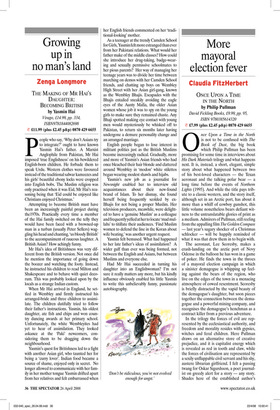Growing up in no man’s land
Zenga Longmore
THE MAKING OF MR HAIS DAUGHTER: BECOMING BRITISH by Yasmin Hai Virago, £14.99, pp. 334, ISBN9781844082698 ✆ £11.99 (plus £2.45 p&p) 0870 429 6655 People who say, ‘Why don’t Asians try to integrate?’ ought to have known Yasmin Hai’s father. A Marxist Anglophile from Pakistan, Mr Hai imposed ‘true Englishness’ on his bewildered English-born children. He forbade them to speak Urdu. Western clothes were favoured instead of the traditional salwar kameezes and his girls’ beautiful ebony locks were cropped into English bobs. The Muslim religion was only practised when it was Eid, Mr Hai’s reasoning being that ‘Eid could be enjoyed like Christians enjoyed Christmas.’ Attempting to become British must have been an increasingly painful project during the1970s. Practically every time a member of the Hai family switched on the telly they would have been faced with a browned-up man in a turban (usually Peter Sellers) waggling his head and chanting, ‘us bloody British’ to the accompaniment of raucous laughter. A British Asian? How achingly funny.
Mr Hai’s idea of Britishness was very different from the British version. Not once did he mention the importance of going down the boozer and watching the footy. Instead, he instructed his children to read Milton and Shakespeare and to behave with quiet decorum. This was probably looked upon by the locals as a strange Indian custom.
When Mr Hai arrived in England, he settled in Wembley and firmly instructed his arranged-bride and three children to assimilate. The children dutifully tried to follow their father’s instructions. Yasmin, his oldest daughter, ate fish and chips and won country dancing awards at her primary school. Unfortunately, the white Wembleyites had yet to hear of assimilation. They looked askance at the ‘Paki’ newcomers, considering them to be dragging down the neighbourhood.
Yasmin’s quest for Britishness led to a fight with another Asian girl, who taunted her for being a ‘curry lover’. Indian food became a source of shame, enjoyed only in secret. No longer allowed to communicate with her family in her mother tongue Yasmin drifted apart from her relatives and felt embarrassed when her English friends commented on her ‘traditional-looking’ mother.
As a teenager at the trendy Camden School for Girls, Yasmin felt more estranged than ever from her Pakistani relations. What would her father make of the middle classes? How could she introduce her drug-taking, badge-wearing and sexually permissive schoolmates to her pious parents? Her way of managing her teenage years was to divide her time between marching on demos with her Camden School friends, and chatting up boys on Wembley High Street with her Asian girl-gang, known as the Wembley Bhajis. Escapades with the Bhajis entailed sneakily avoiding the eagle eyes of the Aunty Mafia, the older Asian women whose job it was to spy on the young girls to make sure they remained chaste. Any Bhaji spotted making eye contact with young men would mysteriously be whisked off to Pakistan, to return six months later having undergone a demure personality change and an arranged marriage.
English people began to lose interest in militant politics just as the British Muslims become increasingly radical. Gradually, more and more of Yasmin’s Asian friends who had once bleached their hair blonde and clattered around Wembley in ‘modon’ white stilettos began wearing modest shawls and hijabs.
Yasmin’s new job as a journalist for Newsnight enabled her to interview old acquaintances about their new-found brand of Islam. To her dismay, she found herself being frequently scolded by exBhajis for not being a proper Muslim. Her television producers, meawhile, were delighted to have a ‘genuine Muslim’ as a colleague and frequently yelled at her to locate ‘mad mullahs’ to titillate their audiences. ‘Find Muslim women to defend the line in the Koran about wife beating,’ was another urgent request.
Yasmin felt bemused. What had happened to her late father’s ideas of assimilation? A wider gulf than ever was being formed, not between the English and Asians, but between Muslims and everyone else.
Had Mr Hai succeeded in turning his daughter into an Englishwoman? I’m not sure it really matters any more, but his kindly influence obviously enabled his little Yasmin to write this unbelievably funny, passionate autobiography.










































































 Previous page
Previous page